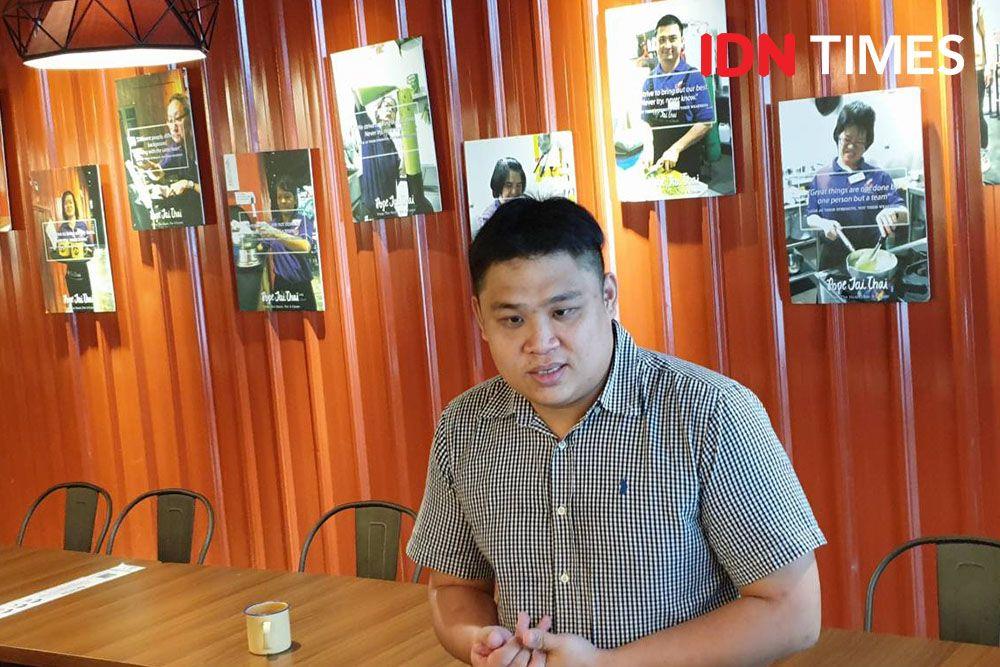By Won Xue Li
“We lost our dear son over seven years ago at the age of 26 after suffering for many years with manic depression,” Mr Chow Yen Lu shared at his TEDx Talk at St Joseph’s Institution in August 2017. “It was a very dark and difficult time for us, my wife and I. His passing on changed the course of our lives.”
Mr Chow is the founder of Over-The-Rainbow, a “one stop hub for youth mental wellness”. His son, Lawrance Chow, had been struggling with depression since he was 18 years old, and months before he was about to graduate with honours in psychology from Australia’s Murdoch University, he committed suicide at the young age of 26 on October 22, 2009.
He was found to have depression whilst at school, and his parents took him back home to Singapore, where he managed to recover. However, upon returning to school, he had relapses and finally took his own life in school after a painful struggle with the illness. He was survived by his parents, Mr Chow Yen Lu and Mrs Chow Yee Ling.
Losing a child was indeed very painful for the both of them and it was perhaps the darkest time of their life. However, the couple decided to follow their son’s words: “Wouldn’t it be nice if we could make a difference in someone’s life?” – and set up Over-The-Rainbow, a youth mental awareness initiative, a year after their son’s death to fulfil his wishes.
“There is never enough,” Mr Chow says of the current state of youth mental health awareness in Singapore. “But the awareness has definitely increased significantly over the five to six years we’ve been working in this area. There are more non-profits working in this sector, the government now has more programmes related to mental health and ground-up initiatives, such as peer support in schools. It is now less of a taboo subject since just a few years ago. More and more people (including mainstream media) are talking about this issue.”
In Singapore, there is an increasing rate of suicide among youths. According to Samaritans of Singapore, the suicide rate for teenagers aged 10-19 was at an all-time high in 2015 and 2016, with children as young as 11 or 12 taking their own lives. This worrying trend reflects the insufficient help given by educational institutions, Mr Chow explains.
“Schools have school counsellors who are the primary channel for students to seek mental health support, but mental health is still mainly an afterthought in the educational institutions – schools are generally quite understaffed (one to two counsellors serving the entire school population) – and the teachers themselves are in fact quite stressed due to the workload and pressure from the system. It’s quite a systemic issue; a lot more needs to be done.”
The topic of teen suicide is still largely seen as taboo in Singapore, and there is certainly a stigma against youth mental disorders socially and at the workplace, Mr Chow says. “However, as we raise the level of awareness and education, the stigma will only decrease over time.” In 2016, Mr Chow spoke at Channel NewsAsia’s Talking Point forum on teen suicide to shatter the taboos surrounding this topic. He strongly believes that we need to raise more awareness about it: ‘‘We need to talk less and listen more. All of us. And when we listen, (we should do so) not just with our ears, but with our heart.”
According to him, the most common forms of mental health issues amongst Singaporean youths are mostly stress, anxiety and depression. Education and academic pressure play large roles in this, but family also plays a part, depending on whether the family environment is supportive or not, and if the parents exert additional pressure.
As a parent who has lost his child to a mental illness, he has a lot to say about what parents can do to support their child. “The support of the parents for their child’s happiness and well-being is critical – to be able to spend quality time with the family and provide the emotional support that a child needs, through thick and thin.”
As peers of people with mental disorders, we can support them by referring them to a good counsellor or psychologist. “Do encourage them to seek help and not let the situation get worse. At the end of the day, prevention is much better than having to treat the disorder.” Alternatively, they can seek help at support groups like Over-The-Rainbow where they have a variety of ways to help them by providing information, assistance and even caregivers to troubled youths.
And what must we not do? “Never tell them to ‘get over it’, or ‘you’re so lazy’,” Mr Chow warns.
“Lend them a good listening ear with a non-judgmental mindset and an open heart.”
In fact, parents play a pivotal role. They need to come to any conversation with attentive listening ears, a caring and compassionate heart, and an open, non-judgmental mindset, although it is more easily said than done. “Parents need to provide that unconditional love which cannot be found anywhere else, and it’s the first place that a young person can turn to for support and safety. Once that communication line is broken, it is the beginning of bigger issues.”
The importance of parents and the institutions teenagers are in play a critical role, but as Mr Chow stated, there is still a taboo surrounding teenage suicide. Parents may sidestep the issue, and schools are not doing nearly enough to address it. However, he believes that the situation will improve with time.
For youths themselves, Over-The-Rainbow promotes a practice of holistic self-care that comprises these principles:
1. Physical: Listening to your body; sufficient sleep, rest, exercise, nutrition, sunshine and time to reflect;
2. Intellectual: Maintaining a sense of curiosity, an appetite for learning new things; staying hungry and foolish;
3. Emotional: Letting go of toxic emotions; cultivate positive emotions of loving kindness, compassion, joy, equanimity; experience positive moments of appreciation, forgiveness, gratitude, generosity, contentment, and inner peace;
4. Social: Making time for family and friends; giving support to and accepting support from others; contributing to the community, volunteering for a cause you believe in;
5. Spiritual: Living authentically – acting from your Deepest Truth; connecting to your Highest Self; finding purpose, meaning, fulfilment.
For more information and assistance for troubled youths, please contact Over-The-Rainbow at contact@overtherainbow.sg or visit their website at http://coc.overtherainbow.sg/.
















